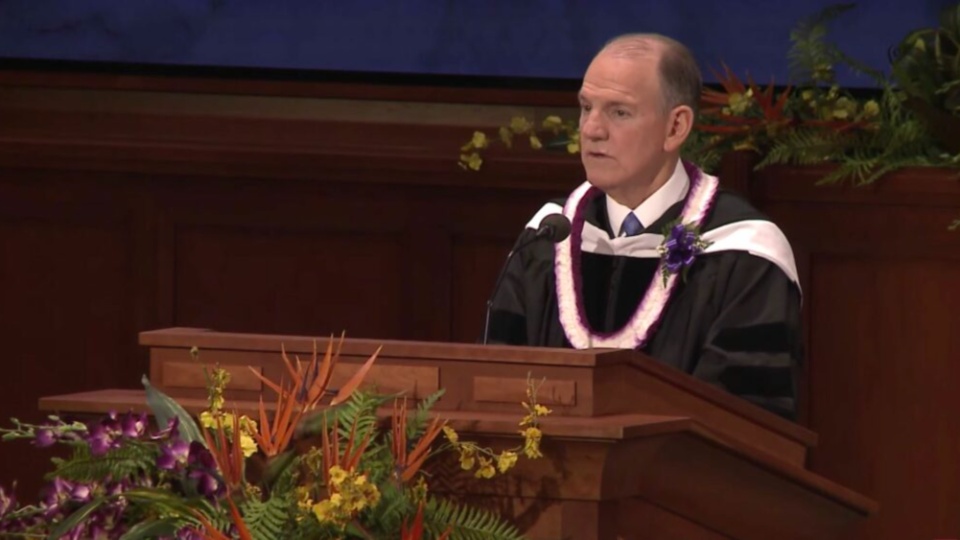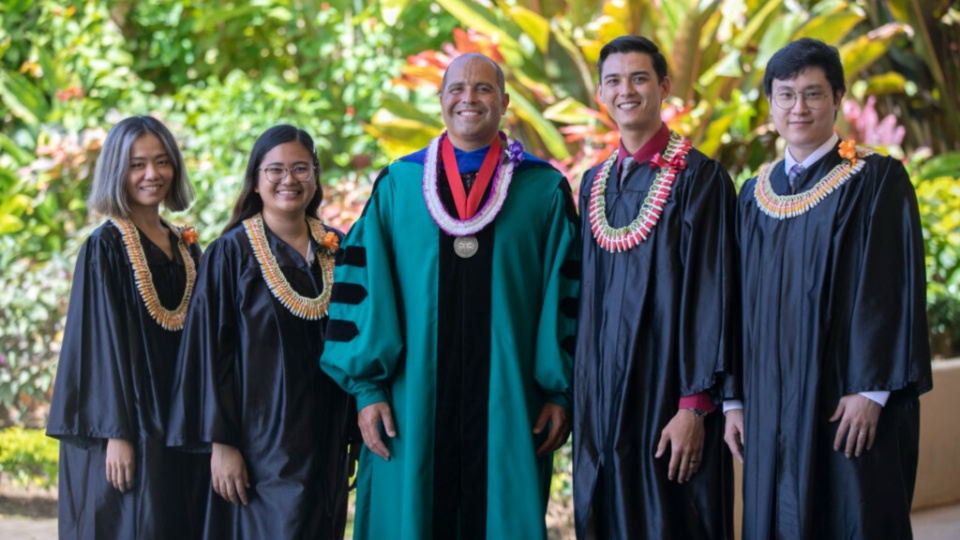
Martino-Commencement
Elder James B. Martino, a General Authority Seventy, speaks to graduates of BYU–Hawaii during the spring commencement broadcast on Saturday, June 26, 2021. Screenshot courtesy of Church News.All rights reserved.This story appears here courtesy of TheChurchNews.com. It is not for use by other media.
By Rachel Sterzer Gibson, Church News
While graduates are faced with many upcoming opportunities regarding their further education and employment, their future happiness will depend to a large degree on their choices, said Elder James B. Martino, a General Authority Seventy.
In speaking to BYU–Hawaii graduates during the university’s online commencement ceremony, which was broadcast on June 26, Elder Martino told the 186 graduates that there will be many things in their lives beyond their control. However, “we may not be able to direct the wind, but we can certainly adjust our sails,” he said.
Heavenly Father wants His children to become joint-heirs with Christ to receive all that the Father has, Elder Martino declared. “This is the ultimate purpose of His great plan of happiness. It is our potential destiny as His children. But it does not just happen to us. We must choose it, and we must commit to that choice with all our heart, mind and strength, even in the face of opposition.”
Elder Martino said he has learned that God gives commandments to bring His children happiness — the kind of happiness only He can offer.
Jesus taught that there are two great commandments: to “love the Lord thy God with all thy heart, and with all thy soul, and with all thy mind” (Matthew 22:37–38) and “to love thy neighbour as thyself” (Matthew 22:39).
Degrees of Happiness
To help listeners better understand the two great commandments, Elder Martino shared the “beautiful vision” Joseph Smith received of the three kingdoms of glory recorded in Doctrine and Covenants 76.
The lowest kingdom, or telestial kingdom, will be inhabited by those who were “liars, and sorcerers, and adulterers, and whoremongers, and whosoever loves and makes a lie” and “received not the gospel, neither the testimony of Jesus” (Doctrine and Covenants 76:103, 101).
“It appears to me that people in this group love themselves more than they love God or their neighbor,” Elder Martino explained. “They place first their own desires, which include greed, power, lust, and whatever it takes to satisfy their personal wants. They do not want to follow the commandments of God, and they do not see their fellow men as their equals.”
These people might experience a type of happiness. “However, it may be the kind that comes from pursuing happiness, not from actually achieving it. To use Samuel the Lamanite’s words, they ‘sought all the days of [their] lives for that which [they] could not obtain’ — ‘happiness in doing iniquity’” (Helaman 13:38).
Those who will inherit the terrestrial kingdom, Elder Martino continued, were “honorable men of the earth, who were blinded by the craftiness of men. These are they who receive of his glory but not of his fulness. … These are they who are not valiant in the testimony of Jesus” (Doctrine and Covenants 76:75–76, 79).
The word “honorable,” Elder Martino said, suggests that these are good people whose hearts were right in helping others. “So what were they missing?” he asked. “I think at least part of the answer is this: They settled. They received some of God’s glory, ‘but not of his fulness.’ … They had a testimony of Jesus; they just were not valiant about it. They chose good over evil, but they also chose good over great. As a reward, they receive happiness. But they could have had more.”
Elder Martino explained that those who inherit the celestial kingdom are “individuals who learned to love God and love their neighbors. They likely sought to eliminate evils in the world. … They had trials and weaknesses, but because they turned to God and ‘received of his fulness and his grace.’ … They fully embrace Heavenly Father’s plan of happiness and the gospel of Jesus Christ, and as a result, they receive a degree of happiness not available in any other way.”
Individuals find happiness by degrees, Elder Martino said. “The degree to which we seek [happiness] will ultimately determine our destiny,” he said.
He then shared three choices that will lead to celestial, or eternal, happiness.

Martino-Commencement
BYU–Hawaii President John S.K. Kauwe III poses with graduates prior to the spring commencement ceremony broadcast on Saturday, June 26, 2021. Photo courtesy of BYU–Hawaii, courtesy of Church News.All rights reserved.Choose to Be Happy
In the case of clinical depression, professional help is needed. “But when it comes to the ups and downs of life we all experience, there is great power in accepting the premise that we can choose to be happy,” Elder Martino said.
To illustrate this principle, he shared an old Native American story where a grandfather explained to his grandson about a fierce battle taking place inside him — and inside all people — between two wolves.
One wolf represents unhappiness and is full of fear, worry, anger, jealousy, sorrow, self-pity and resentment. The other represents happiness and is full of joy, love, serenity, kindness, truth and compassion.
When the grandson asked, “Which wolf will win?” the grandfather replied, “The one I feed.”
“We can choose to be happy by feeding happiness and starving unhappiness,” Elder Martino said. He encouraged individuals to focus on gratitude.
“Happiness comes to those who, like Nephi’s people, live ‘after the manner of happiness’ (2 Nephi 5:27). We must learn to appreciate the good around us. Look for blessings in your life every day. Look for the good in the world and build upon it. Choose to be happy.”
Choose to See Trials and Difficulties as Blessings
Elder Martino related the story of a museum laid with rough-hewn marble tiles. The treasure of the museum was a magnificently crafted marble statue that attracted visitors from around the world.
One night, one of the marble tiles complained about the unfairness of the marble statue receiving all the attention and admiration when both had come from the same quarry.
The statue pointed out that the tile had resisted the tools of the sculptor and therefore limited what he could make out of him.
The statue, on the other hand, bore all the painful chiseling and grinding and polishing and allowed the sculptor to craft as he wanted.
“There is a price for everything in life,” the statue told the tile. “You made your choice, and you cannot blame anybody who steps on you now.”
All will have opportunities to receive some chiseling and grinding and polishing, Elder Martino said. “‘All these things,’ and many more, ‘shall give [you] experience, and shall be for [your] good’ (Doctrine and Covenants 122:7). But that will not happen against your will; therefore, choose to look for opportunities to grow from your experiences.”
Choose to Act and Not Be Acted Upon
There are many influences in the world that call out from all sides, Elder Martino said. “Often the purpose of such messages is to manipulate you. Never forget that you are a son or daughter of God. You were not created to be acted upon. You were created to act for yourself. You were created to have joy, and you were given agency to make choices. Joy comes when we act and are not acted upon (2 Nephi 2:25–26).”
Elder Martino reminded listeners that in all circumstances, they can choose to obey the great commandments. “If we will always keep the perspective first of loving God and then loving our neighbor as ourselves, we will find celestial happiness,” he declared.
BYU–Hawaii President John S.K. Kauwe III also spoke to graduates about choices, encouraging them to submit to the Lord’s will or, in the words of President Russell M. Nelson, to let God prevail in their lives.
“I assure you that when you let His will prevail in your life, He will place you where you need to be at the time that you need to be there,” President Kauwe promised. “He will bless you with opportunities to succeed personally and professionally. He will bless you with the strength to overcome the challenges that are an inevitable part of this life. He will bless you to know how you can best use your talents and capacities to serve your families, your communities, and the building of the kingdom of God.”
BYU–Hawaii’s spring commencement included graduates from 24 countries and 16 states. Of the 186 graduates, 60% were women and 40% were men.
Watch the full address below:
Copyright 2021 Deseret News Publishing Company